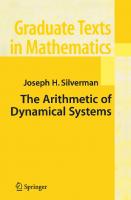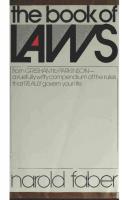The Basic Laws of Arithmetic [Reprint 2020 ed.] 9780520312364
218 53 17MB
English Pages 324 [249] Year 2020
Recommend Papers
![The Basic Laws of Arithmetic [Reprint 2020 ed.]
9780520312364](https://ebin.pub/img/200x200/the-basic-laws-of-arithmetic-reprint-2020nbsped-9780520312364.jpg)
- Author / Uploaded
- Gottlob Frege (editor)
- Montgomery Furth (editor)
File loading please wait...
Citation preview
THE BASIC LAWS OF ARITHMETIC
GOTTLOB FREGE
THE BASIC LAWS OF ARITHMETIC Exposition of the System Translated and Edited, with an Introduction, by MONTGOMERY FURTH
UNIVERSITY OF CALIFORNIA PRESS Berkeley, Los Angeles, London
University of California Press Berkeley and Los Angeles, California University of California Press, Ltd. London, England © 1964 by The Regents of the University of California Library of Congress Catalog Card Number: 64-23479 California Library Reprint Series Edition 1982 ISBN 0-520-04761-3 Manufactured in the United States of America 123456789
EDITOR'S INTRODUCTION
i The publication in 1893 of the first volume of Gottlob Frege's Grimdgesetze der Arithmetik is now widely regarded as a landmark in the history of thought; yet in retrospect it appears in a light rather different from that in which Frege himself viewed it. T o Frege it was the culmination of the work of half a lifetime, intended to afford a rigorous and detailed substantiation of the view (later known as 'logicism') that the content expressed by true propositions of arithmetic and analysis is not something of an irreducibly mathematical character, nor synthetic a prion as Kant had held, nor again empirical in nature as J. S. Mill had held, but to the contrary, such propositions express truths of pure logic. Frege had broached this thesis in his Grundlagen der Arithmetik2 of 1884 for the case of the cardinal numbers, together with elaborate discussion and criticism of rival views and an attempt at a nontechnical philosophical justification of F r e g e ' s approach to the foundations of his subject. The criticisms were lethal and the justification imposing, but Frege was aware that even this did not place his view beyond all doubt. Three further things were required: ( 1 ) we must actually set out a (preferably small) number of assertions which, when their meaning was explained, would be indisputably recognized as expressing truths of pure logic; (2) we must actually set out a (preferably small) number of principles which, when their manner of use was explained, would be indisputably recognized as sound rules of inference, in the sense that, applied to logically true premisses, the transformations 'This
Introduction i s intended c h i e f l y for students
and others to
whom the study of F r e g e i s new, though the connoisseur may find occ a s i o n a l points of interest. 2Bibliographical
information relating to writings of F r e g e referred to
in this Introduction i s given on pp. lviii ff.
V
permitted by these principles could not issue in any but logically true conclusions; and (3) we must then actually produce derivations of the standard propositions of arithmetic and analysis from our propositions of logic (and no other propositions), using our principles of inference (and no other principles). This threefold task was to be carried out in Grundgesetze, For Frege the paramount part of this task was (3); by far the bulk of his book was devoted to it, and it was in terms of the success or failure of (3) that he thought of the success or failure of the book as a whole—as was natural, given his purpose of vindicating 'logicism' by actual demonstration. For us today, on the other hand, the greater value belongs to Frege's handling of (1) and (2). There are several reasons for this. One is that Frege's investigations of the concepts of logical truth and of logical consequence, undertaken in the course of meeting (1) and (2), amounted to the creation single-handed of the subject of mathematical logic as later understood 3 , issuing in a formal system of logic incorporating propositional calculus, first- and second-order quantification theory, and a theory of sets developed within second-order quantification theory. The influence of Frege's formulations upon subsequent developments has been somewhat indirect. At first they were ignored, like the rest of his work. In 1902 they came to the attention of Russell, who by that date had arrived at certain similar ideas independently, and their effect can be discerned to a degree in the system of Whitehead and Russell's Principia Mathematica. But it was Principia and not Grundgesetze that became the foundation for work in logic thereafter; Frege's logical ideas again fell into comparative neglect, and to this date are generally only superficially understood where they differ from those of Principia. Yet these ideas abound in both subtlety and power; further, Frege's presentation is carried out in accordance with standards of definiteness, clarity, and rigor far higher than those prevailing in Principia—standards that were not reattained for many years thereafter. There is a second, related reason for attaching great importance today to Frege's treatment of (1) and (2): that is, Frege's Q
It should be noted that several of the t e c h n i c a l innovations aotually date back to F r e g e ' s early book Begriffsschrift of 1879.
vi
explanation of the primitive b a s i s of his system of logic, and particularly of the primitive symbolism, is undertaken in terms of a deeply thought-out semantical interpretation, which in turn embodies an entire philosophy of language. The influence of the latter upon the semantical structure and even the syntax of the language developed makes itself felt steadily throughout the d i s c u s s i o n . This philosophy of language is very profound, and p o s s e s s e s great interest quite independent of its origin as the handmaiden of 'logicism'. It too is not generally well understood even today. A third point is that the project of the book, regarded as Frege regarded it, was a failure, for the s e t theory of his system is inconsistent, and yet is indispensable for the derivation of propositions of mathematics. The inconsistency, which became known to Frege through a letter from R u s s e l l in the summer of 1902 while the second volume of Grundgesetze was in p r e s s , renders it quite impossible that 'logicism* be substantiated by the system in even e s s e n t i a l l y its present form. And subsequent work dealing with the relations between logic and mathematics has in any c a s e now far outstripped the contribution of Grundgesetze to that subject. Let us dwell for another moment on the relevance of F r e g e ' s work to present-day philosophical i n t e r e s t s . In recent decades of this century within the movement broadly termed 'analytical philosophy' a division has occurred between two approaches to the general topic of meaning. One approach, much the older, finds t h e vehicle of meaning in the linguistic expression-, the other, more recent, is based rather on looking to the use or occ a s i o n s of the use of expressions. The first approach is based on the ancient metaphysical tradition that views phenomena of meaning in the form of relations holding between language and the world; characteristic is its investigation of these phenomena in the context of a formalized language, where the r e s u l t s of enquiry take the form of semantical metatheorems. (This is not new, but as old a s Plato; certain methods are new.) The second approach views phenomena of meaning in terms of the great variety of acts that may be performed by speakers of a language in the everyday contexts of its use; accordingly natural rather than formalized languages are enquired into, and the idea of 'relations between language and the world' as a setting for vii
philosophical investigation is held to be a source of confusion. Proponents of the first approach derogate the second as imprecise, unscientific, and willfully or ignorantly shirking the tools of modern logic. Proponents of the second approach derogate the first for its oversimplifying of the richness and multiplicity of language, for studying idealized abstract structures instead of language as it is, and for hypostatizing meanings. It is a misfortune, though perhaps inevitable, that this division has presented itself as a conflict, since the approaches are obviously complementary and rivalry has obstructed fruitful investigation of their mutual relations. The importance of F r e g e ' s work, which falls squarely within the first approach, is simply this: the theory of meaning it presents is more subtle and more complex than any other such theory of its kind, subtle and complex in ways that have not been taken into account in attacks either upon it or upon better known theories falling within the same category. The point is not that this theory should therefore be acknowledged as carrying the day for the first approach, but that a thorough understanding of it may help to form a basis upon which we might hope to penetrate the problems that the two approaches face in common. Thus Frege's book, viewed as he viewed it, is chiefly of historical interest—though the chapter of history it constitutes is a great one. Viewed from a modern standpoint, however, it is well worth study in its own right by philosophers as well as logicians and historians of thought, and it is in this spirit that the present translation of its philosophically and logically most important portions is offered. In what follows I give first a rapid and superficial description of the course of developments in the parts here translated, then comment somewhat more fully on certain points of particular importance, and finally offer some notes to the translation itself.
2 The present work is a translation of approximately one-fifth of Grundgesetze der Arithmetik, consisting of the introductory portions of the first volume and an epilogue appended to the second (Appendix II, below). It falls into three parts. First is Frege's Introduction to the first volume, outlining the book and its aims, and distinguishing its standpoint from the viii
then current 'formalism' in mathematics 4 and 'psychologism' in logic. T h e treatment of the latter turns into a long and rather violent polemic against Erdmann's Logik6\ one gathers that the appearance of this book in 1892 on the eve of the publication of Grundgesetze had exasperated F r e g e beyond endurance. It should perhaps be remembered that F r e g e had some c a u s e for bitterness in the complacent misunderstanding and lack of appreciation accorded his earlier works, where indeed they were noticed at all; and no doubt he was right in laying a large part of the blame upon fashionable ' p s y c h o l o g i z i n g ' t e n d e n c i e s among contemporary l o g i c i a n s . However this may be, the Foreword is useful in conveying an idea of the role that the book was intended to play and the prevailing situation in which it was to play it, at l e a s t as t h e s e appeared to F r e g e . T h e second and chief part is the " E x p o s i t i o n of the B e g r i f f s s c h r i f t " , a compressed but extremely thorough exposition of the formalized language in which the later reasoning of Grundgesetze i s carried out, together with informal j u s t i f i c a t i o n s of the propositions to be adopted as axioms ( ' B a s i c L a w s ' ) without proof, and of the rules of inference to be employed in generating new propositions from the axioms. T h e " E x p o s i t i o n " begins with a brief survey of the kinds of e n t i t i e s comprising the logical universe of the book: functions, including concepts and r e l a t i o n s 6 , and objects, including truthvalues, courses-of-values and the e x t e n s i o n s of c o n c e p t s . Then we turn to the system i t s e l f : names of truth-values are first distinguished from asserted propositions, and then names of various functions are introduced that are later to be used in forming complex names of truth-values (as well as of other o b j e c t s ) , and 4 This is not the later 'formalism' of Hilbert, a program of seeking metamathematical consistency proofs for classical mathematics, but a view ascribing to classical mathematics itself the intrinsic character of being a 'game* played by mampulating symbols on paper. Frege might have put the difference thus: the procedure of the later (Hilbertian) formalist cannot be described without distinguishing between the use and the mention of mathematical expressions; the view of the earlier derives from confusing them.
®Benno Erdmann, Logik. Band I. B/S.: MaxNiemeyer, 1892).
Logische
Elementarlehre
(Halle
' " R e l a t i o n " is always understood to mean binary relation. ix
thereby in asserted propositions. T h e s e function-names correspond more or l e s s c l o s e l y to the modern truth-functional conn e c t i v e s of negation and the conditional, a l s o the identity-sign and the (first-order) quantifiers 7 , a notation for courses-of-values and what corresponds to an operation-symbol for forming definite descriptions. But here it must be borne in mind that for F r e g e the negation- and conditional-signs, for example, are in fact not connectives—in the s e n s e in which a connective is a syncategorematic expression or 'improper symbol' not i t s e l f having denotation—but names denoting certain functions. Not only are they so called, but they are regarded as r e p l a c e a b l e by variab l e s , which for a syncategorematic expression is impossible. The same applies to the definite-description sign, which is not literally an operation-symbol but a function-name. All of t h e s e signs are explained informally in accordance with the semantical viewpoint of the book, accompanied by many examples. Next we encounter transformation-rules, regarded as permitting transitions from one asserted proposition (not: name of a truthvalue) to another. For sentential logic t h e s e answer roughly to Modus P o n e n s , Hypothetical Syllogism, Contraposition, and a rule for which there is no title in general use but which might be called 'Concentration of Antecedents'. For predicate logic there is a rule of Universal Generalization. ( R u l e s of substitution and of alphabetic change of bound variable are laid down later, in the Summary of the R u l e s . ) Axioms ( ' B a s i c L a w s ' ) are laid down, whose nearest equivalents in more recent notation would be p -> (q -» p)


![The Laws [Reprint ed.]
9780140442229, 0140442227](https://ebin.pub/img/200x200/the-laws-reprintnbsped-9780140442229-0140442227.jpg)






